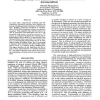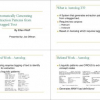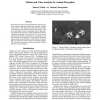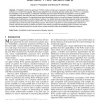AAAI
1996
14 years 1 months ago
1996
In recent years, compositional modeling and selfexplanatory simulation techniques have simplified the process of building dynamic simulators of physical systems. Building steady-s...
AAAI
1996
14 years 1 months ago
1996
We present a connectionist architecture that supports almost instantaneous deductive and abductive reasoning. The deduction algorithm responds in few steps for single rule queries...
AAAI
1996
14 years 1 months ago
1996
Procedural representations of control policies have two advantages when facing the scale-up problem in learning tasks. First they are implicit, with potential for inductive genera...
AAAI
1996
14 years 1 months ago
1996
AAAI
1996
14 years 1 months ago
1996
We describe a framework for robot navigation that exploits the continuity of image sequences. Tracked visual features both guide the robot and provide predictive information about...
AAAI
1996
14 years 1 months ago
1996
We propose novel gaze control algorithms for active perception in mobile autonomous agents with directable, foveated vision sensors. Our agents are realistic artificial animals, o...
AAAI
1996
14 years 1 months ago
1996
Breiman's bagging and Freund and Schapire's boosting are recent methods for improving the predictive power of classi er learning systems. Both form a set of classi ers t...
AAAI
1996
14 years 1 months ago
1996
AAAI
1996
14 years 1 months ago
1996
An agent operating in an unpredictable world must be able to take advantage of opportunities but cannot afford to perform a detailed analysis of the effects of every nuance of the...
AAAI
1996
14 years 1 months ago
1996
The state space of most adversary games is a directed graph. However, due to the success of simple recursive algorithms based on Alpha-Beta, theoreticians and practitioners have c...




